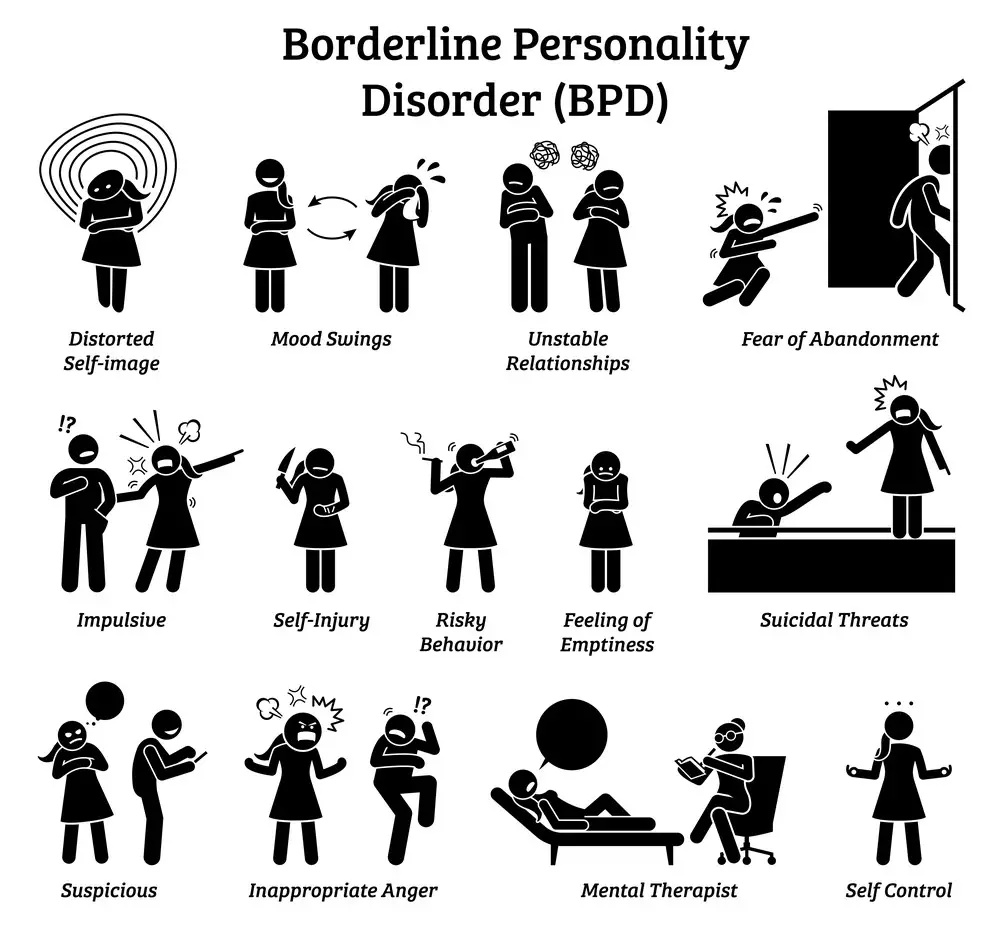As a BetterHelp affiliate, we receive compensation from BetterHelp if you purchase products or services through the links provided
Are you aware that about 1.6% of the adult population in the United States has Borderline Personality Disorder (BPD)? Dating someone with BPD can present unique challenges, but with understanding and support, it is possible to build a fulfilling and loving relationship.
By gaining insight into the complexities of BPD relationships, you can navigate the challenges with empathy, patience, and effective communication. This article will explore the stressors, communication issues, and emotional management strategies that can arise when dating a partner with BPD.
Understanding the dynamics of BPD relationships can help you provide support and understand your partner’s needs while caring for your emotional well-being.

The BPD Basics
Understanding BPD entails grasping its complex interplay of emotions, behaviors, and relationships. Borderline Personality Disorder (BPD) is a mental health condition that profoundly impacts an individual’s thoughts, feelings, and behaviors.
It’s characterized by intense mood swings, chronic instability, and a persistent fear of abandonment, making it challenging to maintain stable and healthy relationships. BPD affects less than 2% of the adult U.S. population, with a higher prevalence among women.
The exact causes of BPD aren’t fully understood. Still, it’s believed to stem from a combination of genetic predisposition and environmental factors, including traumatic experiences during childhood and irregular brain development.
Symptoms of BPD include profound mood changes, impulsive behaviors, and an unstable sense of self. If left untreated, BPD can lead to self-harm and a heightened risk of suicide. Seeking professional evaluation and diagnosis is crucial for effective management of BPD.
Therapists can provide personalized treatment plans, which may include therapy, medication, and the development of coping strategies. While navigating a relationship with someone whose BPD can be challenging, it’s essential to approach it with patience, understanding, and a commitment to open communication.
By educating oneself about BPD, acknowledging the unique challenges it presents, and seeking support from mental health professionals, it’s possible to foster a healthy and supportive relationship.

Navigating Intense Emotions
When dating someone with BPD, it’s essential to recognize that navigating intense emotions can significantly impact the dynamics of your relationship. The quick and intense emotional responses characteristic of BPD can present both a draw and a challenge in the relationship.
The emotional sensitivity of individuals with BPD can create a deep and meaningful connection, but it can also lead to heightened conflict and distress. Understanding and managing these intense emotions is crucial for fostering a healthy and stable relationship.
It’s important to acknowledge that individuals with BPD may experience emotions more intensely than others. Their responses to everyday situations, stressors, and conflicts can be amplified.
As their partner, it’s vital to approach these intense emotions with empathy and understanding. Acknowledge the validity of their feelings and provide a supportive environment for them to express and process their emotions.
Navigating intense emotions in a relationship with someone with BPD requires patience and resilience. Cultivating open and honest communication is essential, allowing both partners to express their feelings and concerns without judgment.
Setting and respecting boundaries can help manage the impact of intense emotions on the relationship dynamics. Encouraging your partner to engage in therapy and treatment can also provide them with valuable tools to regulate their emotions and navigate the challenges posed by BPD.
Remember that while navigating intense emotions in a relationship with someone with BPD can be demanding, it can also lead to personal growth and a deeper understanding of emotions and relationships.

Building Trust And Boundaries
Navigating intense emotions in a relationship with someone with BPD requires patience and resilience. Establishing clear boundaries and fostering trust is essential to creating a stable and supportive environment for both partners.
Building trust and boundaries in a relationship with someone who has BPD is a crucial aspect of maintaining a healthy and fulfilling connection. Trust is the cornerstone of any successful relationship, and for individuals with BPD, establishing and nurturing trust can be incredibly challenging.
It’s important to acknowledge that building trust takes time and consistent effort. Be open and honest in your communication, follow through on your commitments, and offer reassurance when needed.
Creating clear boundaries is equally vital. Setting boundaries not only helps in managing expectations but also protects the emotional well-being of both partners. Communicate your needs and limits while also respecting those of your partner.
Remember, boundaries aren’t meant to restrict or control but to create a sense of safety and predictability in the relationship. Emphasize the importance of mutual respect and understanding when establishing these boundaries.
Communication Strategies
You can improve communication in a relationship with someone with BPD by being open and receptive to their feelings and perspectives. Understanding that individuals with BPD may experience intense emotions and have difficulty regulating them is crucial.
When communicating, validate their feelings and let them know that their emotions are heard and acknowledged. Being patient and non-judgmental is important, as is creating a safe space for open dialogue.
Listen to your partner without interruption and reflect on your understanding to ensure you’re on the same page. This demonstrates that you value their thoughts and are invested in understanding them.
Avoid making assumptions and be clear in your communication, using straightforward language to convey your thoughts and feelings. Setting aside time for regular check-ins can also be beneficial.
This provides an opportunity to openly discuss any concerns, fears, or needs within the relationship, fostering a sense of security and understanding. It’s essential to approach these conversations with empathy and compassion, recognizing that your partner’s experiences and perspectives may differ from your own.
Be mindful of your non-verbal cues, which convey much information. Your body language, the tone of your voice, and your facial expressions communicate more than you can imagine, especially to someone with BPD. Ensure these queues are consistent with your words and communicate support for your partner.
Supporting Mental Health
To support each other’s mental health, partners must prioritize open communication, empathy, and validation in their relationship with someone who has BPD. Creating a safe and stable environment that fosters trust and understanding is essential.
Consistent reassurance and validation can help your partner feel more secure and reduce their fear of abandonment. Be empathetic and understanding of their emotional experiences, even when challenging.
Encourage open communication about their feelings and thoughts, and actively listen without judgment. In addition to providing emotional support, it’s important to encourage and assist your partner in seeking professional help.
Support them in attending therapy sessions and taking any prescribed medication. Show interest in understanding their treatment plan and offer assistance with accessing mental health resources.
Collaborate with your partner in identifying potential triggers and developing coping strategies to manage difficult emotions and situations. Taking care of your mental well-being is equally important.
Engage in self-care practices and seek support from therapists or support groups to navigate the complexities of the relationship. Establishing and maintaining healthy boundaries is crucial for both partners’ mental health.
Remember that it’s okay to seek help for yourself, which can strengthen your ability to support your partner effectively.

Seeking Professional Help
Supporting your partner in seeking professional help is essential for managing the challenges of dating someone with BPD. It’s crucial to remember that seeking help isn’t a sign of weakness but rather a proactive step towards managing BPD symptoms and fostering a healthier relationship.
Encouraging your partner to pursue therapy, particularly Dialectical Behavior Therapy (DBT) and Cognitive Behavioral Therapy (CBT), can significantly aid in developing coping mechanisms and emotional regulation skills.
These therapeutic approaches are effective in helping individuals with BPD manage intense emotions and impulsive behaviors, thus contributing to more stable and fulfilling relationships. Medication may also play a role in managing specific BPD symptoms.
While medication isn’t a cure for BPD, it can help alleviate certain symptoms, making it easier for individuals to engage in therapy and implement new coping strategies. Professional help isn’t limited to the individual with BPD; it’s equally important for their partner to seek support, whether through couples therapy or individual counseling.
Navigating a relationship with someone who has BPD can be challenging, and having a supportive space to address your own needs, concerns, and emotions is essential for maintaining your well-being and the health of the relationship.
Finding Balance In The Relationship
Finding balance in a relationship with someone who has Borderline Personality Disorder (BPD) involves understanding their emotional responses and perspectives and taking proactive steps to foster a supportive environment. Here are some practical tips to enhance the balance in such a relationship:
- Understand Emotional Responses: People with BPD often have intense emotional reactions. Recognizing that these are not attempts to manipulate but rather biological responses can help approach them with empathy.
- Acknowledge Partner’s Perception: Be aware that your partner may have specific perceptions about the relationship, which can affect how they relate to you.
- Maintain Your Well-being: Ensure your partner’s needs do not overly consume you at the expense of your well-being. Engage in activities outside the relationship and maintain connections with friends and family.
- Set Healthy Boundaries: Establish and respect boundaries to protect your emotional well-being and your partner’s. This promotes stability and trust in the relationship.
- Communicate Effectively: Understand the importance of clear communication. Actively listen and validate your partner’s feelings to avoid misunderstandings and conflicts.
- Detach With Love When Necessary: Sometimes, creating a healthy distance from the negative consequences of your partner’s actions is essential. This helps in making objective decisions and managing your emotional health.
Each step requires patience, understanding, and a commitment to nurturing the relationship while respecting individual needs and boundaries.
Conclusion
Dating someone with BPD presents unique challenges that require empathy, patience, and effective communication to navigate successfully. To maintain a healthy and supportive relationship, it’s essential to grasp the fundamentals of BPD, manage intense emotions, establish trust and boundaries, and seek professional assistance when necessary.
Remember to prioritize your emotional well-being while offering support and understanding your partner’s needs. You can find balance and happiness in your relationship with the right approach. Stay positive and encouraged as you journey together.
- How Having Cybersecurity Protection Helps You Relax - April 25, 2025
- 8 Reasons Why Spending Time Outside Calms You Down - April 25, 2025
- 5 Helpful Ideas for Managing Stress During a Plumbing Emergency - April 24, 2025
This site contains affiliate links to products. We will receive a commission for purchases made through these links.



